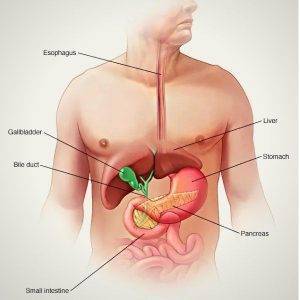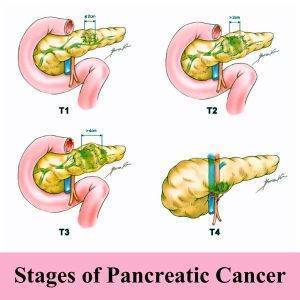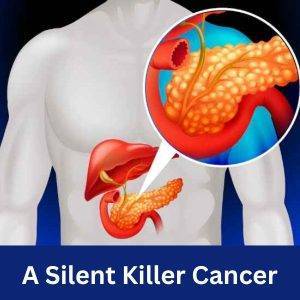“Don’t be silent about Pancreatic Cancer: Early Detection is Key!”
Overview
Pancreatic cancer is a devastating disease that is often referred to as the “silent killer” due to its ability to go undetected until it is too late. It is the fifth leading cause of cancer-related deaths in the world and is one of the most difficult cancers to treat.
This is because the cancer is often asymptomatic until it has spread to other organs, making it difficult to detect in its early stages. As such, it is important to be aware of the risk factors and symptoms associated with this cancer to catch it early and improve the chances of successful treatment.
What is Pancreatic Cancer?
Pancreatic cancer is a serious and life-threatening disease that affects the pancreas, a small organ located behind the stomach. It is a malignant tumor that can grow anywhere in the pancreas but is most commonly found in the tail (pancreaticoduodenal) section.  It is usually diagnosed when it has advanced beyond the early stages.
It is usually diagnosed when it has advanced beyond the early stages.
Warning Signs
Be aware of the symptoms of Pancreatic cancer which include:
- Abdominal pain. This pain may be felt in the upper abdomen, the back, or the sides. It may be a dull ache or a sharp, stabbing pain.
- Jaundice
- Weight loss
- Loss of appetite
- Nausea
- Vomiting
With early detection and the right treatment, you can beat this disease and live a long and healthy life.
Stages of Pancreatic Cancer
 Stage 0: At this stage, the cancer is confined to the top layers of cells in the pancreas and has not spread to other parts of the body.
Stage 0: At this stage, the cancer is confined to the top layers of cells in the pancreas and has not spread to other parts of the body.
Stage I: In this stage, cancer has spread to nearby tissues and organs, but has not yet reached the lymph nodes.
Stage II: In this stage, cancer has spread to the lymph nodes, but has not yet reached other parts of the body.
Stage III: In stage III, cancer has spread to other parts of the body, such as the liver or lungs.
Stage IV: In this last stage, cancer has spread to other parts of the body, such as the liver or lungs, and become dangerous.
Why Pancreatic Cancer is called Silent Killer Cancer?
Pancreatic cancer is often referred to as the “Silent Killer” because it is often diagnosed too late for effective treatment. This type of cancer is particularly difficult to detect in its early stages because it does not produce any noticeable symptoms.
By the time the cancer is discovered, it has often already spread to other parts of the body, making it much more difficult to treat. It is one of the most aggressive and deadly forms of cancer, with a five-year survival rate of just 9%.
It is one of the most aggressive and deadly forms of cancer, with a five-year survival rate of just 9%.
Advances in medical technology have made it possible to detect the disease earlier, giving patients a better chance of successful treatment.
The best way to fight this cancer is to be proactive about your health. Regular check-ups and screenings can help detect the disease in its early stages when it is most treatable.
Eating a healthy diet, exercising regularly, and avoiding smoking and excessive alcohol consumption can also help reduce your risk of developing the disease.
Risk Factors for Pancreatic Cancer
Knowing the risk factors can help you take steps to reduce your risk and live a healthier life.
The most common risk factor for pancreatic cancer is age. People over the age of 45 are more likely to develop the disease.
Other risk factors include smoking, obesity, diabetes, and a family history of pancreatic cancer. People with a history of chronic pancreatitis, a condition in which the pancreas becomes inflamed, are also at an increased risk.
There are many things you can do to reduce your risk, such as quitting smoking, maintaining a healthy weight, and eating a balanced diet. Regular exercise and avoiding alcohol can also help reduce your risk.
Be aware of the signs and symptoms of pancreatic cancer. If you experience any of the symptoms, it is important to see your doctor right away.
Treatment Options to Cure Pancreatic Cancer
Pancreatic cancer is a serious and life-threatening illness, but it is not a death sentence. With the right treatment and care, it is possible to beat this disease and live a long and healthy life.
The first step in treating cancer is to determine the stage of cancer. This will help your doctor decide which treatment options are best for you.
Depending on the stage of cancer, treatment may include:
Surgery is the most common treatment for pancreatic cancer. During surgery, the surgeon will remove the tumor and some of the surrounding tissue. Depending on the size and location of the tumor, the surgeon may also remove part or all of the pancreas.
Chemotherapy is a type of treatment that uses drugs to kill cancer cells. It is often used in combination with surgery to help reduce the risk of cancer coming back.
Radiation therapy is another treatment option for pancreatic cancer. It uses high-energy beams of radiation to kill cancer cells. Radiation therapy may be used before or after surgery, or it may be used alone.
In addition to these treatments, several clinical trials are exploring new treatments for this cancer. These trials are testing new drugs, immunotherapies, and other treatments that may be more effective than current treatments.
With determination and courage, you can beat pancreatic cancer and reclaim your life.
Impact of Cancer on Quality of Life
Pancreatic cancer is a devastating diagnosis that can have a profound impact on a person’s quality of life. It is a complex and aggressive form of cancer that can be difficult to treat and can cause a wide range of physical and emotional symptoms.
Despite the challenges that pancreatic cancer presents, it is possible to maintain a good quality of life.
The physical symptoms of pancreatic cancer can be severe and can affect a person’s ability to perform everyday activities. Talk to your doctor about ways to manage these symptoms and to find ways to stay active and engaged in life.
Fear, anxiety, and depression are all common emotional reactions to a diagnosis of pancreatic cancer.
Find ways to cope with these emotions and reach out for support from family, friends, and healthcare professionals. Stay positive and focus on the things that bring joy and meaning to life.






